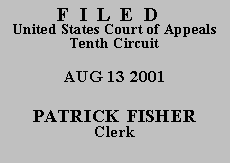

| EDMUND NOWOSIELSKI,
v.
DEBBIE MAHAFFEY |
No. 01-6020
(D.C. No. 00-CV-1136-R) |
Nowosielski was convicted of first degree murder and sentenced to life imprisonment without the possibility of parole. Nowosielski timely appealed his conviction and sentence to the Oklahoma Court of Criminal Appeals ("OCCA"). The OCCA affirmed Nowosielski's conviction on April 23, 1997. He filed a § 2254 petition in a federal district court for a writ of habeas corpus on May 26, 2000. The petition was referred to a magistrate judge who recommended, after considering applicable periods of tolling, that the petition be denied as untimely under the one-year time limit of the Antiterrorism and Effective Death Penalty Act of 1996 ("AEDPA"). See Doc. 11 (citing 28 U.S.C. § 2244(d)). The magistrate judge also rejected Nowosielski's argument that applying the one-year limitations period against him would violate the Suspension Clause of the United States Constitution, see U.S. Const. art. I, § 9 cl. 2 ("[T]he Writ of Habeas Corpus shall not be suspended"), on the ground that this limitations period did not render the habeas remedy "inadequate" or "ineffective." See Doc. 11 at 7-8 (citing Miller v. Marr, 141 F.3d 976, 977 (10th Cir. 1998)).
The district court adopted in its entirety the Report and Recommendation of the magistrate judge, rejecting Nowosielski's objections to it. See Doc. 14. Consequently, the district court dismissed the petition. See id. After determining that "'[j]urists of reason' would not find debatable whether [Nowosielski's] Petition is time barred," the district court also denied his request for a certificate of appealability. See Doc. 19 (citing Slack v. McDaniel, 529 U.S. 473 (2000)).
For substantially the reasons stated in the district court's order, we decline to issue a certificate of appealability. See 28 U.S.C. § 2253(c); Fed. R. App. P. 22(b). Accordingly, this appeal is DISMISSED.
ENTERED FOR THE COURT
David M. Ebel
Circuit Judge
*.After examining appellant's brief and the appellate record, this panel has determined unanimously that oral argument would not materially assist the determination of this appeal. See Fed. R. App. P. 34(a)(2) and 10th Cir. R. 34.1(G). The case is therefore ordered submitted without oral argument. This Order and Judgment is not binding precedent, except under the doctrines of law of the case, res judicata, and collateral estoppel. The court generally disfavors the citation of orders and judgments; nevertheless, an order and judgment may be cited under the terms and conditions of 10th Cir. R. 36.3.